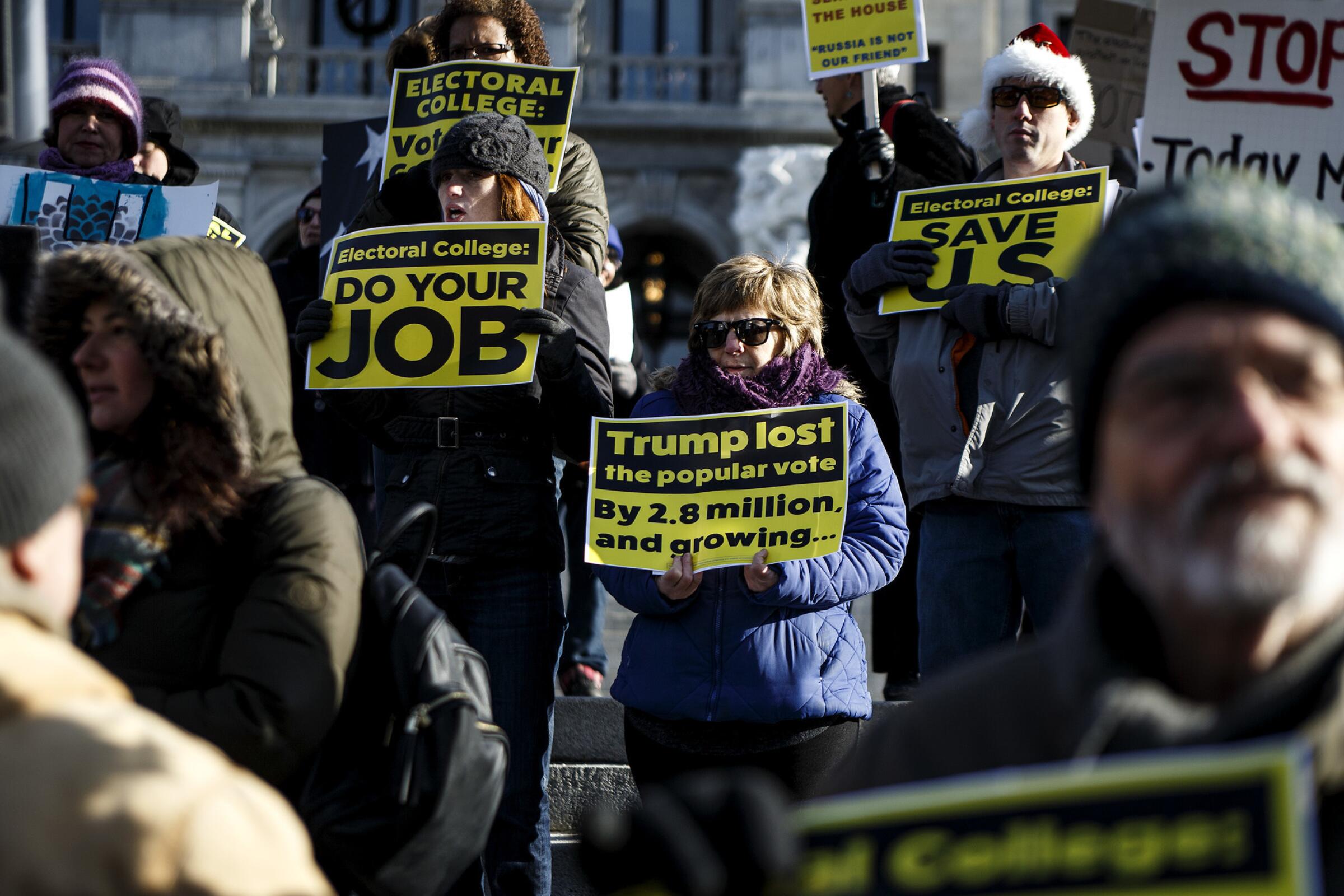A cure for the common opinion
Get thought-provoking perspectives with our weekly newsletter.
You may occasionally receive promotional content from the Los Angeles Times.

A federal appeals court recently found that the Constitution requires presidential electors to be free to vote their conscience. Under this decision, states can ask its electoral-college members to publicly promise to vote for a particular candidate — for example, whoever wins the popular vote in the state — but they can’t throw out a vote cast in violation of that pledge.
Specifically, the 10th U.S. Circuit Court of Appeals, in Denver, ruled that Micheal Baca, a Democratic elector in Colorado acted within his rights when he cast his electoral college vote for John Kasich instead of the state winner, Hillary Clinton, in 2016. Some, like Harvard Law professor Noah Feldman, reacted with dismay: The ruling might allow one “rogue” elector to create “electoral college chaos,” Feldman wrote.
I’m the director of the group Equal Citizens and the attorney who successfully argued the Baca case in the appellate court, and I’m here to say I’m not pro-chaos, and this decision is not pro-chaos. Rather, it’s just the opposite: The very point of the litigation is to make the courts resolve and clarify exactly how our “creaky, little-understood electoral college system” — in the words of Los Angeles Times reporter David G. Savage — must work. Our case will reduce the risk of a disastrous, contested presidential election, and help to spur needed change in the way votes are counted.
What the critics miss when they worry this decision will lead to random chaos is just how unstable and murky the status quo already is.
Under the Constitution, when we vote for president and vice president, we’re actually choosing a slate of state party electors, who then formally elect the president, in most cases on a winner-takes-all basis. Californians, for example, elected a slate from the Democratic Party when they chose Clinton in 2016. The slate then cast all the state’s 55 electoral college votes for her.
Twenty states — including Pennsylvania, a crucial swing state, and Texas, which commands 38 electoral college votes (second only to California) — have no laws binding electors to follow the voters’ lead; it’s just a norm. Meanwhile, the other 30 (plus the District of Columbia) have a patchwork of hard-to-decipher rules meant to keep electors in line. Some include civil or criminal penalties for “faithless,” or independent, electors. Some states say they can replace electors who violate a pledge to support a ticket. (Colorado had such a replacement law, and that’s what the appeals court struck down.)
So far in our history, no presidential election has been decided by independent electors. This is largely because most electors vote the way they were expected to. And in elections where a few have gone rogue, the electoral college vote simply wasn’t close enough for the deviation to make a difference. This makes sense: The electors, usually party insiders, have every reason to stick to the ticket.
And yet, here is the trouble lurking in plain sight. The Supreme Court has never decided if or how the states can enforce promises made by electors. The Baca case, along with a Washington state Supreme Court ruling that came to the opposite conclusion, should make it hard for the high court to avoid the issue any longer.
At Equal Citizens, we hope it happens sooner rather than later. American presidential elections are getting closer and closer, and faithless electors’ votes could one day be a deciding factor. It would be better for the Supreme Court to resolve that question now, for all the states, rather than under the gun, in the midst of a heated, highly partisan dispute over the outcome of a presidential race. Another Bush vs. Gore could tear the country apart.
For the record:
9:21 a.m. Sept. 6, 2019An earlier version of this story misspelled Micheal Baca’s name; it is Micheal not Michael.
As important as it is to clarify our electoral rules of the road, Equal Citizens has an additional goal. Pressing Baca’s case all the way to the Supreme Court helps pull back the curtain in general on the outdated mechanism of the electoral college.
A high court ruling that electors and states aren’t bound to follow the states’ results could add support for a reform like the National Popular Vote Compact. States in the pact agree that they will award all their electoral votes to the candidate who matches the national will, not the state’s. The pact would reform the system set up by the founders without doing away with it, ensuring that the winner in the electoral college is also always the winner of the most votes nationally.
At the same time, if the Supreme Court were to reverse the Baca decision and decide that states are acting within their power when they bind electors, we would at least have certainty about how the system should work. That, too, could help states arrive at effective ways to put the candidate most voters want into the White House.
Jason Harrow is director and chief counsel of Equal Citizens.
A cure for the common opinion
Get thought-provoking perspectives with our weekly newsletter.
You may occasionally receive promotional content from the Los Angeles Times.